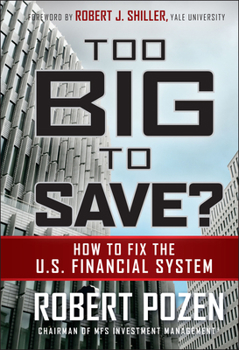Too Big to Save? How to Fix the U.S. Financial System
Select Format
Select Condition 
Book Overview
Industry luminary Robert Pozen offers his insights on the future of U.S. finance
The recent credit crisis and the resulting bailout program are unprecedented events in the financial industry. While it's important to understand what got us here, it's even more important to consider how we should get out. While there is little question that immediate action was required to stabilize the situation, it is now time to look for a long-term plan to reform the United States financial industry.
That is where Bob Pozen comes in. Perhaps more than anyone in the industry, Pozen commands the respect and attention of the public and private sector. In this timely guide, he outlines his vision for the new financial future and provides actionable advice along the way. To Pozen, there are four high-priority problems that must be addressed, and this book puts them in perspective
With Too Big to Save, you'll learn the likely future of the finance industry and understand why changes have to be made.





